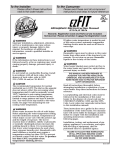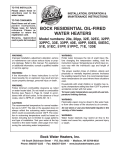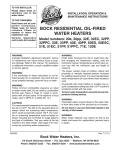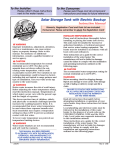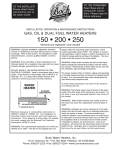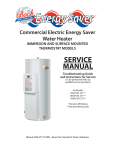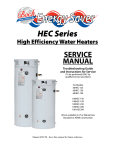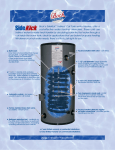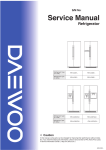Download Bock Water heaters operation Instruction manual
Transcript
TO THE INSTALLER: Please attach these instructions next to the water heater. TO THE CONSUMER: Read these and all component instructions. Please keep for future reference. Waranty, registration card & parts list included. INSTALLATION, OPERATION & MAINTENANCE INSTRUCTIONS OIL-FIRED WATER HEATERS 72E • 73E • 190E • 241E • 361E • 541E WARNING: Improper installation, adjustment, alteration, service or maintenance can cause serious injury or property damage. Refer to this manual. For assistance or additional information, consult a qualified installer or service agency. WARNING: If the information in these instructions is not followed exactly, fire or explosion may result and can cause property damage, personal injury or death. DO NOT INSTALL THE WATER HEATER ON COMBUSTIBLE FLOORING. Install in accordance with all local codes. In the absence of local codes, refer to NFPA 31 or ANSI Z21.10.1, or contact Bock Water Heaters with questions concerning proper flooring materials. which could occasionally exceed 120oF. The variation in outcoming temperature could be based on factors including but not limited to usage patterns and type of installation. Test your water at the tap nearest to the water heater. WARNING: Hotter water increases the risk of scald injury. Before changing the temperature setting, read the instruction manual. Temperatures at which injury occurs vary with the individualʼs age and length of exposure. The slower reaction times of children, elderly and physically or mentally impaired persons increases the scalding hazard to them. It is recommended lower water temperatures be used where these situations exist. To lower water temperature use point-of-use temperature limiting devices. WARNING: Flammable vapors may be drawn to this water heater from other areas of the structure by air currents. Do not store or use any flammable liquids in the vicinity of this heater. WARNING: Water heater blankets may restrict air flow to the heater and cause fire, asphyxiation, personal injury or death. Minimum clearance to combustible construction is: SIDES 6"; BACK 6"; FRONT 24". The installation of this water heater must conform with local codes and ordinances. In the absence of local codes, the installation must comply with the National Fire Protection Association (NFPA 31) Code. WARNING: The recommended temperature for normal residential use is 120oF. The dial on the aquastat does not always reflect the outcoming water temperature, WARNING: Hydrogen gas can be produced in a hot water system that has not been used for an extended period–generally, two weeks or longer. To prevent possible injury under this situation, we recommend that a hot water faucet be wide open for several minutes before you use ANY electrical appliance that is connected to the hot water system. If hydrogen is present, an unusual sound – such as air escaping – will come from the open faucet as the hot water begins to flow. Hydrogen gas is extremely flammable – there must be no open flame near this open faucet. Bock Water Heaters, Inc. 110 S. Dickinson St. • P.O. Box 8632 • Madison, WI 53708-8632 Phone: 608/257-2225 • Fax: 608/257-5304 • www.bockwaterheaters.com PERFORMANCE SPECIFICATIONS AND ROUGHING-IN DIMENSIONS CAUTION: The recommended water temperature setting for normal residential use is 120OF. Leave ample room for servicing when the water heater is installed – do not block access to the burner, inspection door, handholes or controls. Leave room to pipe the unit and connect the fuel and electricity. BURNER SPECIFICATIONS 72E 73E 190E 241E 361E 541E MODEL/OEM # NOZZLE PRESSURE 1.50X70OB 1.75X80OB 1.50X60OB 150 PSI 100 PSI 150 PSI CARLIN EZ-2HP/9833222J72E WAYNE MSR/371-019B RIELLO R35.5/C8512221 RIELLO 40F10/ 1.25X70OB 1.50X80OB 1.25X60OB 1.25X60OB WAYNE MSR/371-129B CARLIN EZ-1/9682811J190E BECKETT AF 1.35X70OB 1.35X70OB 1.35X70OB CARLIN EZ-2HP/9833222J73E WAYNE MSR/371-022B RIELLO 40F10/C8514109 CARLIN EZ-2HP/9833111J241E WAYNE 371-024B CARLIN 201CRD/98285000B541E WAYNE EH/371-028 PSI PSI PSI PSI 100 PSI 100 PSI 100 PSI 1.65X70OB 2.0X80OB 150 PSI 100 PSI 4.00X70OB 4.50X80OB 130 PSI 100 PSI 2.50X70OB 3.00X80OA CARLIN 201CRD/98285000B361E WAYNE EH/371-026 SIZES AND CAPACITIES 150 100 150 150 150 PSI 100 PSI (shipping weights are complete assembly, including burners and controls) 73E, 190E, 241E, 361E –2– 541E 1.50 1.75 1.35 2.00 3.00 4.50 GPH GPH GPH GPH GPH GPH MODEL A 72E & 73E 58” 190E 661/4” 241E 67” 361E 541E 67” 66” 120V 120V 120V 120V 120V 120V 60HZ 60HZ 60HZ 60HZ 60HZ 60HZ B C 28” 20” 311/2” 201/2” 311/2” 22” 311/2” 26” 34” 301/2” SHIPPING WEIGHT MOTOR STANDARD ASME 1/7 HP 550 LBS. –– 1/7 HP 550 LBS. –– 1/7 HP 690 LBS. –– 1/7 HP 925 LBS. 950 LBS. 1/4 HP 1105 LBS. 1125 LBS. 1/4 HP 1330 LBS. 1340 LBS. D 16” 19” 19” 23” NA * Nipple not furnished E 8” 6” 8” 9” 10” 11/2”* 11/2” 2”* 1” 2”* 11/2” 2”* 2”* ALT INLET/ RETURN ** GAL. GAL. GAL. GAL. GAL. GAL. STANDARD VOLTAGE DRAIN 72E 67 67 113 109 91 83 FIRING RATE COLD INLET 72E 73E 190E 241E 361E 541E BTUH INPUT 199,000 242,000 190,000 277,000 415,000 623,000 HOT OUTLET * STORAGE MODEL CAPACITY 1” 2”* 3/4” 11/2” 3/4” 2” 3/4” 2” 3/4” 3/4” ** Under drain valve on 72E & 73E only 2” 2” COMBUSTION & VENTILATION AIR NOTE: All ducts must have the same cross sectional area as the free area of each opening to which they connect. The minimum side dimension of a rectangular duct must be no smaller than three (3) inches. Care must be taken to insure an adequate air supply for the water heater. A. Install equipment only where the water heater will have satisfactory combustion, proper venting, and the maintenance of temperature at safe limits all around the unit under normal operating conditions. Free circulation of air around the water heater is essential. If the air supply is inadequate, introduce outside air. Any temperature above 90°F around the heater indicates a need for additional air (see NFPA 31 for air requirements). B. In addition to air needed for combustion, air may be required for draft control; cooling off; controlling dew point; heating; drying; oxidation or dilution; safety exhaust; odor control; and compressors. C. Make sure air around the water heater is adequate for personnel comfort and working conditions. D. Check for proper draft. Place a draft gauge in the chimney above the draft diverter. Drafts should be at least -0.02" W. C. and less than -0.05” W.C. while the water heater is in operation. Unconfined space: No additional combustion and ventilation air is required if the volume of the space is greater than 50 cubic feet per 1,000 BTUH of the combined total input of all equipment installed in that space. Rooms leading directly to the space through openings which cannot be closed are considered part of the unconfined space. Confined space: When the unit will be installed in a space with a volume of less than 50 cubic feet per 1,000 BTUH, the space must be vented at the floor for combustion air and at the ceiling for ventilation. This air can be supplied from either inside or outside of the building as conditions allow (refer to NFPA 31 or local codes). A. Inside air supply: Provide two permanent openings; one within 12" of the top of the enclosure and one within 12" of the bottom, leading directly to room(s) of sufficient volume so that the combined volume of all the space meets the criteria for unconfined space. Each opening requires a minimum free area of one (1) square inch (two square inches total) per 1,000 BTUH of the combined total input of all equipment installed in the enclosure, but not less than 100 square inches. B. Outside air supply: Provide two permanent openings; one within 12" of the top of the enclosure and one within 12" of the bottom. These openings must lead directly to crawl and attic spaces leading directly to the outside of the building. Caution: Operation of exhaust fans, ventilating systems, power burners, induced draft systems, clothes dryers, or fireplaces may create conditions that require special attention to avoid unsatisfactory operation of installed equipment. T&P RELIEF VALVE ATTACH BURNER & OIL LINES –3– 1. Leading directly to outside or through vertical ducts: Each opening (top and bottom) requires a minimum free area of one (1) square inch (two square inches total) per 4,000 BTUH of the combined total input of all equipment installed in the enclosure. 2. Leading to the outside through horizontal ducts: Each opening (top and bottom) requires a minimum free area of one (1) square inch (two square inches total) per 2,000 BTUH of the combined total input of all equipment installed in the enclosure. Louvers and grilles: In calculating the “free” area in Equipment Located in Confined Spaces, consider the blocking effects of louvers, grilles, or screens protecting openings. The screens cannot be smaller than one (1) inch of mesh. If the “free” area of a louver or grille is known, it should be used in calculating the size opening required to provide the “free” area specified. If the design and “free” area is not known, assume wood louvers have 20% to 25% “free” area, and metal louvers and grilles 60% to 75%. Fix louvers and grilles in the open position or interlock with the equipment so they are opening automatically during equipment operation. WATER PIPING: Models 72E, 73E, 190E, 241E and 361E have polysulfone dip tubes. When using sweat fittings, do not apply heat to the nipples. Pipe hot and cold lines with a union and valve on each line. If backflow preventers and pressure regulators are installed or if the heater is installed in a closed system, allow for water expansion by installing either a thermal expansion valve or an expansion tank in the system. Contact the local water supplier or plumbing inspector to correct the situation. The Bock factory has installed the properly rated temperature and pressure (T&P) relief valve. To prevent water damage when relief occurs, install a discharge line from the relief valve outlet to a place for water disposal. Do not install reducing coupling or other restriction in the discharge line. Arrange the line to allow complete drainage of both the relief valve and the discharge line. If the T&P relief valve discharges periodically, service to the water system is required. Do not place the shut-off valve between the relief valve and the water heater. Check handholes for tightness. 1. The operating thermostat and high limit are packed with the burner. Mount the burner with bolts provided. Burners are shipped with all settings at the approximate start point. Check inside the combustion chamber to verify that the burner tube is not obstructed or protruding into the chamber. Swing back the hinged transformer and rotate the blower wheel by hand a few turns to loosen the pump seal. Install a water softener if the heater is being used in a hard water area (water hardness of more than seven grains). FIGURE 1 2. Bock recommends a two-pipe (suction and return) system for these heaters. Use 1/2" O.D. soft copper tubing (5/8” O.D. soft copper on Sun Tec H pumps) and install a bypass plug on two-pipe system. (See instructions packed with pump.) Note: Do not install a bypass plug if using a gravity (one-pipe) system. (See Figure 1.) For multiple heater installations, run a separate suction and return line for each heater. (See Figure 2.) If the combined lift and horizontal run exceeds 100ʼ, install a booster pump as close to the supply tank as possible. Booster pumps may be obtained from Sun Tec Hydraulics, Rockford, Ill. GRAVITY SYSTEM FIGURE 2 3. Return lines must be the same diameter as suction lines and extend close to the bottom of storage tank but stop slightly above suction lines. Use a minimum of fittings and make bends in tubing with as large a radius as possible. Always use flared fittings, not compression fittings. If pipe is used instead of tubing, do not connect the burner to the pipe – use copper tubing and form a coil before attaching tubing to burner. 4. When installing an oil water heater with an existing oil tank and lines, check existing line sizes and compare to instructions shipped with the pump to see if they are adequate. Do not use existing lines if they are smaller than 1/2" O.D. tube on Models 361E and 541E. Proceed as follows: A. If existing oil heater has a one-pipe system, tee into the system to furnish oil to the heater. B. If the existing oil heater has a two-pipe system, check whether the return line extends to the bottom of the tank. It may be preferable to change the existing oil heater to a onepipe system and change the return line to the suction line for the heater. C. If (B) is not applicable, tee into the existing suction line and the existing return line to supply oil to the heater. Both suction and return lines must extend to the bottom of the tank, but if the tubing is too small and a two-stage pump is on the existing oil appliance, the water heater pump may be starved for oil. D. If return lines do not extend to the bottom of the tank, use check valves on each suction line as close to each burner as possible to prevent air from being drawn through the return line. E. Before teeing into an existing oil line, check the vacuum gauge in the 1/4" inlet port or the vent opening. A single-stage pump should not exceed 12" hg vacuum and a two-stage pump should not exceed 17" hg vacuum on two-pipe systems. If the heater performs poorly, recheck the vacuum reading – a high reading will indicate too much resistance. This could be caused by a clogged filter, a restricted shutoff valve, kinked tubing, an obstruction in the oil line, excessive lift or too long a run. F. If none of the above installations are suitable, Bock recommends an oil booster pump located as close to the oil supply as possible. Use the existing supply and return lines for the booster pump. Change the existing unit to a one-pipe system and tee off the one pipe to supply oil to the water heater. CONNECT TO CHIMNEY ELECTRIC WIRING PUTTING HEATER INTO OPERATION –4– Using “L” or “A” type venting, connect the heater to the chimney. Do not reduce the smoke pipe diameter; use the same size smoke pipe as the heater flue pipe. Run a separate connector from the heater to the chimney where possible. If the heater must be joined to another oil appliance breaching before going into the chimney, enlarge the existing breaching to accommodate the extra volume of gases from the heater. The entrance into the breaching should be at a 45O angle. Wiring must be done in accordance with the National Electrical Code and local ordinances. Burners are supplied with an operating thermostat (Honeywell L4103A or Carlin EZ-Temp 90000B on 72E, Honeywell L4006A or Carlin EZ-Temp 90000C or Carlin EZ-Temp 90300B on the 73E through 361E, and Honeywell L8100C or Carlin EZ-Temp 90300B on 190E and 541E). Models 73E through 541E equipped with Honeywell controls are also supplied with a separate L40801B high limit (see wiring diagrams). The operating thermostat should be set at 120OF for normal domestic hot water use; higher temperatures increase the risk of scalding. Do not set higher than 180OF. The differential control wheel on the L4006 control (73E-361E) should be set to 15OF. The high limit control (L4080B used on 73E541E) should be set 20OF or higher above the operating thermostat setting. The maximum setting is 200OF. Fill the heater with water, opening a hot water faucet to allow trapped air to escape. Check handholes for tightness. Check the fuel supply and all fuel lines for tightness. Rotate the blower wheel to loosen the pump shaft seal. Bleed air from the oil line by opening the bleed valve on the fuel pump. Attach a small plastic tube to the bleed valve fitting on pump and run to a gallon container. Turn on the electricity and set the thermostat so the burner motor runs. The heater will not ignite when the bleed valve is open. Bleed the line until the oil is completely clear (not milky or opaque), transparent and free of air bubbles and froth. Shut the bleed valve and the burner will ignite. Remove the plastic tube. To keep the burner control from locking out while bleeding, attach a jumper between the flame detector terminals after starting the burner (remove the jumper when done). Double-check control settings as described previously. SET DRAFT AND ADJUST BURNER COMBUSTION (see burner instructions) 1. Start the burner and adjust draft to the -.02 in H2O to -.05 in H2O. 2. Verify that the pump pressure matches the values in the chart. 3. Check the smoke and adjust the air to give #1 smoke. 4. Readjust to give a trace or zero smoke. 5. Check that the CO2/O2 level is at 11% or higher. Note: Do not attempt to adjust the burner without instruments. 6. Open the air adjustment to lower the CO2 by .5% or 1% to allow for draft and fuel variations (refer to the burner manufacturerʼs recommendations). SERVICE: The thermostat has been adjusted to 120°F at the factory. Wait until thermostat has shut off fuel to the main burner; wait 30 seconds following shut off of fuel, then set thermostat to the highest temperature. The main burner should re-light. Set thermostat to the lowest temperature; the main burner should go out. The thermostat should be adjusted in accordance with the local codes or to the minimum setting that will meet the hot water needs of the consumer. Bock recommends 120°F temperature settings for residential applications for safety as well as energy efficiency. 1. Check the fuel supply, electrical wiring and fuses. Make sure the temperature control is set for heat. 2. If the motor runs but there is no flame, remove the electrode assembly, clean and readjust. Check the electrode porcelain for cracks and replace if necessary. Check the transformer to see if it is producing a strong spark. (Use extreme caution – the transformer has a 10,000 volt output.) Check that the coupling between the motor and pump shaft is not slipping. Check the set screw on the blower wheel for tightness. Clean or replace the nozzle if necessary, always using the correct size and spray angle provided by the manufacturer. 3. Bleed the pump to make sure the oil is clear and free of air bubbles. If the oil is milky or frothy, check the line for air leaks at fittings. Check the oil filter gaskets and make sure the filter cartridge is clean. 4. If the burner motor does not run, check the motor thermal overload button (red) and reset. If the burner motor does not run after pushing the red button on the back of the motor, turn the motor off and check the motor shaft to see if it is tight. Check the pump shaft; if it is free and the motor will not run, replace the flame detector located in the burner housing. Turn on the current and reset the control (relay). If the motor still does not run, replace the control (relay). If motor hums and gets hot, replace the motor. 5. If the burner ignites and runs a short time (10 to 15 seconds) and goes out on safety, replace the flame detector. If the burner still runs only a short time, replace the control. 6. The smell of oil or combustion products may be caused by poor draft or lack of combustion air. Remove and clean the electrode assembly and check the draft in the connector directly above the heater. There should be at least .01 inches W.C.. draft (pull) or greater. Regular maintenance will keep the water heater operating at peak efficiency. The tank can fail prematurely from the accumulation of lime and sediment in the bottom, excessive pressure and/or corrosion. MAGNESIUM ANODE RODS FREEZING –5– Lime and sediment: Such accumulations can be controlled to an extent by softening the water. The tank should be inspected every six months by draining the tank, removing the hand hole cover, and making a visual check of the tank interior. If lime (or sediment) has accumulated, it should be removed by use of a commercial lime dissolving chemical or by scraping loose the deposit and flushing it away through the hand hole or drain. Excessive pressure is controlled by the T&P relief valve. Water expands when heated and the extra volume of water must have a place to go. If water cannot expand into the cold water line because of a check valve, pressure builds as the water heats. The pressure relief valve opens, and dumps the extra volume of water. If the relief valve is faulty or none has been installed, the tank can fail due to this excessive pressure. Open the relief valve at least once a year to make sure the seat is not stuck. Caution: Before opening the relief valve be certain that the discharge line directs the water away from anything that could be damaged or would block the flow of water to the drain. Stand away from the outlet to avoid contact with the water. Rods are installed in the head of the tank to help prevent corrosion of the tank. When inspecting the tank interior for lime or sediment accumulations, also inspect the condition of the anode rods. When either rod has eroded to about one third of its original diameter, it should be replaced. Vent system should be checked at least once a year for damage and/or blockage. If the water heater is to be shut off during cold weather, the tank and water lines should be drained to prevent freezing and piping damage. Please see warning on hydrogen gas buildup on page 1. IMPORTANT! The water heater warranty will be invalid if the tank fails due to excessive pressure, the accumulation of lime or sediment, corrosion, or freezing. The Bock Water Heaters warranty (back page) explicitly documents further causes of invalidation. FIGURE 3 WAYNE Models 73E - 541E FIGURE 4 Wayne Model 72E L4080B L8106 L4006A FIGURE 5 Carlin burner w/ Carlin EZ-Temp Models 72E, 73E, 190E, 241E, 361E, 541E –6– FIGURE 6 Wayne burner w/ Carlin EZ-Temp (all models) Beckett burner with Carlin EZ-Temp (Only 190E) FIGURE 7 OIL-FIRED WATER HEATER MODELS 72E, 73E, 190E, 241E, 361E & 541E This is a tank assembly parts list. When ordering repair parts, always give the part name, heater number (size) and serial number. ITEM DESCRIPTION 1. Cold water inlet dip tube (not on 541E) 2. Plastic cap 3. Anode rod 4. Top pan 5. Hot out connection 6. Tank 7. Outer jacket 8. Relief valve 9. Aquastat 10. Drain valve 11. Burner mounting bracket –7– ITEM DESCRIPTION 12. Burner mounting gasket 13. Bottom pan 14. Combustion chamber sleeve 15. Combustion chamber 16. Inspection plug 17. Inspection door 18. Burner 19. Relay 20. Handhold cover plate 21. Handhold cover gasket 22. High limit 23. Cad cell 5 7 3 4 15 14 RELAY (where listed) 2 13 2. . . . . . . . . . . . . . . . . . . . . . . . . . . .Junction Box ASM 3. . . . . . . . . . . . . . . . . . . . . . . . . . . . . . . . . . . . . .Motor 4. . . . . . . . . . . . . . . . . . . . . . . . . . . . . . . .Blower Wheel 5. . . . . . . . . . . . . . . . . . . . . . . . . . . .Motor Cord Cover 10 12 6. . . . . . . . . . . . . . . . . . . . . . . . . . . .Transformer/Igniter 7. . . . . . . . . . . . . . . . . . . . . . . . . . . . . . .Housing Cover 8. . . . . . . . . . . . . . . . . . . . . . . . . . . . . . . . . . . .Coupling 9A. . . . . . . . . . . . . . . . . . . . . . . . . . . . . . . . . . .Fuel Unit 10. . . . . . . . . . . . . . . . . . . . . . . . . . . .Oil Line Assembly 11. . . . . . . . . . . . . . . . . . . . . . . . .Air Adjst. Band, Inner 12. . . . . . . . . . . . . . . . . . . . . . . . .Air Adjst. Band, Outer 13. . . . . . . . . . . . . . . . . . . . . . . . . . . . . . . . . . . .Air Tube 17 13. . . . . . . . . . . . . . . . . . . . . . . . . . . . . . .Gun Assembly 9A CAD CELL 18 DESCRIPTION 1. . . . . . . . . . . . . . . . . . . . . . . . . . . . . .Burner Housing 6 11 1 13 ITEM BURNER PARTS LIST 14. . . . . . . . . . . . . . . . . . . . . . . . . . . . . . . . . . . . .Gasket 15. . . . . . . . . . . . . . . . . . . . . . . . . . . . .Mounting Flange 17. . . . . . . . . . . . . . . . . . . . . . . . . . . . . . .Oil Line Elbow 18. . . . . . . . . . . . . . . . . . . . . . . . . . . . . . . . . . .Air Cone 19. . . . . . . . . . . . . . . . . . . . . . . . . . . . . .Nozzle Adapter 20. . . . . . . . . . . . . . . . . . . . . . . . . . . .Electrode Support 21. . . . . . . . . . . . . . . . . . . . . . . .Electrode Asmbly (RH) 22. . . . . . . . . . . . . . . . . . . . . . . .Electrode Asmbly (LH) Please have burner make, model and serial number available when ordering parts. LIMITED WARRANTY WARRANTY COVERAGE: This warranty covers “Bock” Water Heater models 72E, 73E, 190E, 241E, 361E and 541E. Bock Water Heaters, a division of Bock Corporation – a Wisconsin corporation – at 110 S. Dickinson St., Madison, WI 53703, (“Company”), warrants to the owner that the tank of this water heater will not leak due to defective materials or workmanship for THREE (3) years from the date of original installation. The company also warrants that no other part of this water heater will fail due to a defect in material or workmanship for one (1) year. This warranty does not apply where the purchase is for resale. COMPANY RESPONSIBILITY: Bock Water Heaterʼs responsibility is to repair or replace, at our option with the prevailing comparable model, any part of the equipment sold by the Company which proves to be defective in material or workmanship, including the tank, during the warranty period when installed in accordance with applicable codes and ordinances and operated and maintained in accordance with our instructions, subject to the conditions and exceptions indicated below. Our liability, in the vent of leakage or other malfunction, is strictly limited to repair or replacement of the defective heater or part as provided herein. We are not responsible hereunder for incidental property damage or personal injury, consequential costs or damage. OWNER RESPONSIBILITY: At the companyʼs request, the owner is to return to the factory at Madison, WI any part, including the tank, defective in material or workmanship and pay all transportation charges for such return parts and for replacement parts sent from the factory to the owner. The owner will pay all labor charges for the removal and installation of such parts, including the tank. EXCEPTIONS: This warranty will not apply to tanks or parts subject to misuse, abuse, neglect, alteration, accident, excessive temperature, excessive pressure, lime, silt or sediment accumulation, corrosive atmosphere, the removal of anode rods, installation outside of the USA, or on which the serial numbers have been altered. The warranty also does not apply when the water heater is installed without a new temperature and pressure relief valve and is not installed in accordance with local codes and ordinances. TOTAL WARRANTY COMMITMENT: We will not assume nor authorize any person to assume for us any other liability in connection with the sale or operation of Bock Water Heaters. Any implied warranties, including merchantability or fitness for a particular application imposed on the sale of this heater under laws of the state of sale are limited to one (1) year. Some states do not allow limitations on how long an implied warranty lasts or for the exclusion of incidental or consequential damages, so the above limitations or exclusions may not apply to the purchaser. This warranty gives specific legal rights – other rights may vary from state to state. WARRANTY REGISTRATION: The card should be returned within thirty (30) days of the date of installation; otherwise, the date of manufacture will be recorded as the date of installation for the purpose of this warranty. TO MAKE A CLAIM: Contact your nearest Bock distributor or: –8– Bock Water Heaters, Inc. • 110 S. Dickinson St. • Madison, WI 53703 Phone: 608/257-2225 • Fax: 608/257-5304 • www.bockwaterheaters.com Form 23400 Rev 6 3/2011








